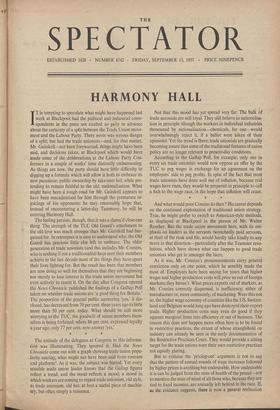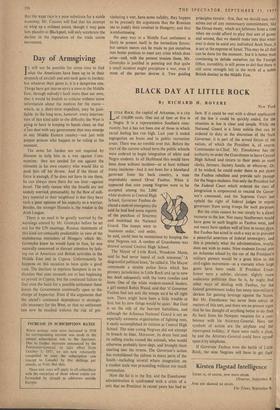HARMONY HALL
IT is tempting to speculate what might have happened last week at Blackpool had the political and industrial corre- spondents in the press not exulted so gaily in advance about the certainty of a split between the Trade Union move- ment and the Labour Party. There never was serious danger of a split; but had the trade unionists—and, for that matter, Mr. Gaitskell—not been forewarned, things might have been said, and decisions taken, at Blackpool which would have made some of the deliberations at the Labour Party Con- ference in a couple of weeks' time distinctly embarrassing. As things are now, the party should have little difficulty in digging up a formula which will allow it both to embrace its new paramour, public ownership by take-over bid, while pre- tending to remain faithful to the old, nationalisation. What might have been a rough road for Mr. Gaitskell appears to have been macadamised for him through the premature re- joicings of his opponents; he may reasonably hope that, instead of encountering a latter-day Tammany, he will be entering Harmony Hall.
The feeling persists, though, that it was a damn'd close-run thing. The strength of the TUC Old Guard's attachment to the old love was much stronger than Mr. Gaitskell had bar- gained for. In retrospect it is easy to understand why; the Old Guard has precious little ' else left to embrace. The older generation of trade unionists (and this includes Mr. Cousins, who is nothing if not a traditionalist) haxe seen their members achieve in the last decade most of the things they have spent their lives fighting for. But the result has been that members are now doing so well for themselves that they are beginning not merely to lose interest in the trade union movement but even actively to resent it. On the day after Congress opened the News Chronicle published the findings of a Gallup Poll taken on whether trade unions are 'a good thing for Britain.' The proportion of the general public answering 'yes,' it dis- closed, has decreased from 70 per cent. three years ago to little more than 50 per cent. today. What should be still more wOrrying to the TUC, the goodwill of union members them- selves is being forfeited; where 86 per cent. expressed loyalty a year ago, only 77 per cent. now answer 'yes.'
* - * * , The attitude of the delegates at Congress to this informa- tion was illuminating. They ignored it. Had the News Chronicle come out with a graph showing trade union popu- larity soaring, what might not have been said from rostrum and platform ! As it was, the subject was buried. Yet every sensible trade union leader knows that the Gallup figures reflect a trend, and the trend reflects a mood; a mood in which workers are coming to regard trade unionism, old style, as trade unionism, old hat; at best a useful piece of machin- ery, but often simply a nuisance. Not that this mood has yet spread very far. The bulk Of trade unionists are still loyal. They still believe in nationalisa- tion in principle (though the workers in individual industries threatened by nationalisation—chemicals, for one—would overwhelmingly reject it, if a ballot were taken of their opinions). Yet the trend is there; trade unionists are gradually becoming aWare that some of the traditional features of union policy are no longer relevant to present-day conditions.
According to the Gallup Poll, for example, only one in every six trade unionists would now oppose an offer by the TUC to peg wages in exchange for an agreement on the employers' side to peg profits. In spite of the fact that most trade unionists have done well out of inflation, because real wages have risen, they would be prepared in principle to call a halt to the wage race, in the hope that inflation will cease.
And what would poor Cousins do then? His career depends on the continued exploitation of traditional union strategy. True, he might prefer to switch to American-style methods, as displayed at Blackpool in the person of Mr. Walter Reuther. But the trade union movement here, with its em- phasis on leaders as the servants (wretchedly paid servants, at that) of the rank and file, would hardly take kindly to any move in that direction—particularly after the Teamster reve- lations, which have shown what can happen to good trade unionists who get in amongst the lucre.
As it was, Mr. Cousins's pronouncements carry general conviction only on one point, which he sensibly made the most of. Employer's have been saying for years that higher wages and higher production costs will price us out of foreign markets; they haven't. What prices exports out of markets, as Mr. Cousins correctly diagnosed, is inefficiency; either of manufacture or, more commonly, of marketing. Were this not so, the higher wage economy of countries like the US, Switzer- land and Belgium would long ago have destroyed their export trade. Higher production costs may even do good if they squeeze marginal firms into efficiency or out of business. The reason this does not happen more often here is to be found in restrictive practices, the extent of whose stranglehold on industry can already be seen in the early documentation of the Restrictive Practices Court. They would provide a sitting target for the trade unions were their own restrictive practices not equally glaring.
But to criticise the 'pricing-out' argument is not to say that the pattern of annual rounds of wage increases followed by higher prices is anything but undesirable. How undesirable it is can be judged from the state of health of the pound—not to mention the state of mind of all those who, because they are tied to fixed incomes, are annually left behind in the race. If, as the evidence suggests, there is now a general realisation that the wage race is a poor substitute for a stable economy, Mr. Cousins will find that his attempt to whip up a militant mood, though it may gain him plaudits at Blackpool, will only accelerate the decline in- the reputation of the trade union movement.



































 Previous page
Previous page